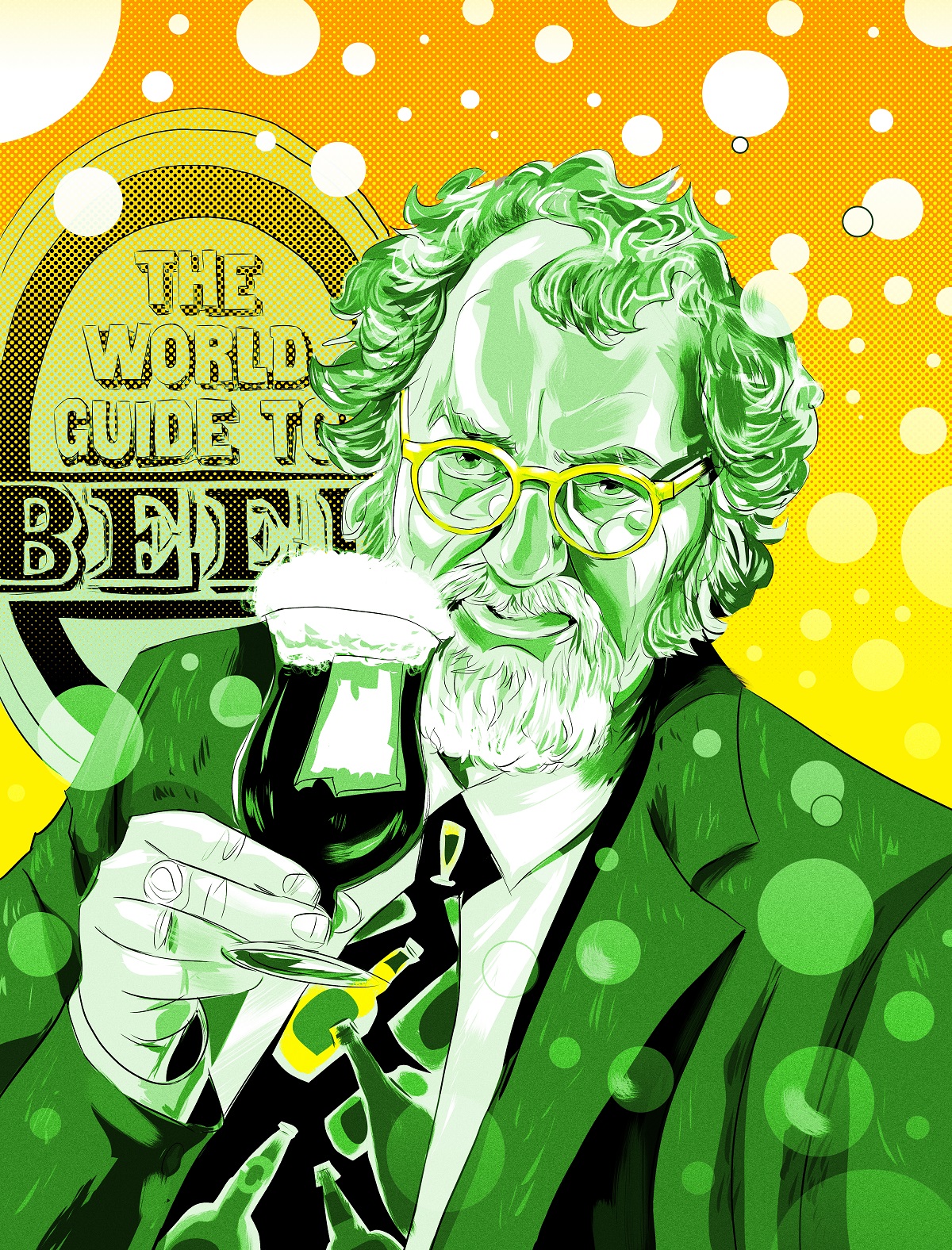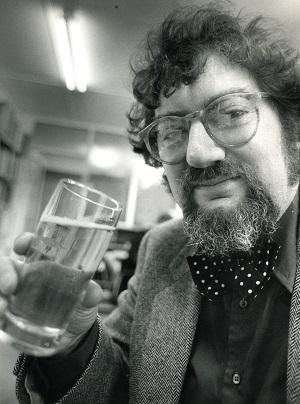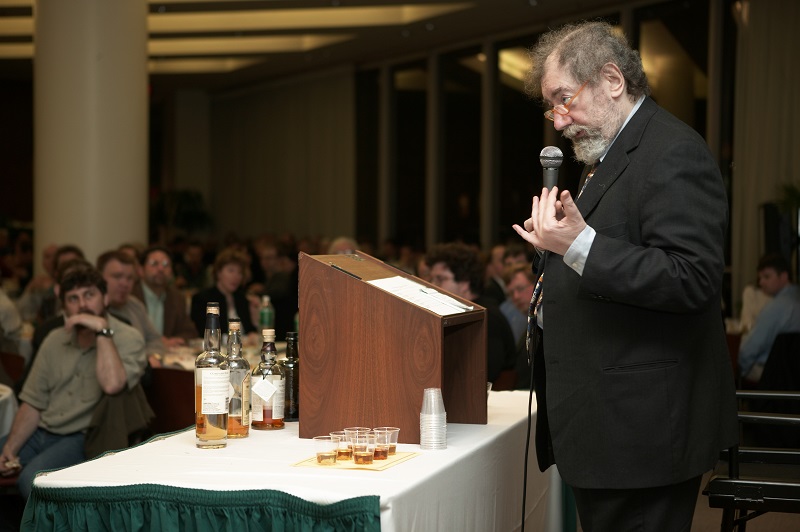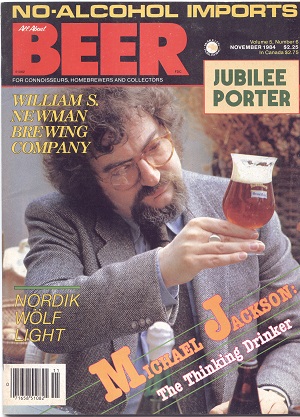Remembering the Bard of Beer: Why There Will Never Be Another Michael Jackson

(Illustration by Ryan Inzana)
It was toward the end of September 2006, and a 64-year-old Englishman was making his way through the Denver airport. He was rotund, with an ample belly and shaggy grayish hair spilling in curls from every part of his scalp save the balding front. He sported a similarly grayish beard that seemed in need of a trim, and his eyebrows were arched, as if signaling perpetual surprise at his surroundings.
The man was catching a flight back home to London. But he never made it.
He instead found himself in the back of an ambulance on the way to the hospital. He was having what turned out to be a mild heart attack and drifting from consciousness.
That did not stop the paramedics from asking for his autograph.
And that did not surprise Michael Jackson, the Englishman just then skirting death, in the least. Jackson had by that point been the foremost beer critic on the planet for nearly 30 years. In areas dense with ale and lager aficionados, including Denver, which had just hosted the 25th annual Great American Beer Festival that September, he was famous—or famous enough that, when he introduced himself as “Michael Jackson,” people didn’t laugh. They knew he wasn’t the pop star, but a rock star unto himself.
He made it back before the end of 2006 to his home in London’s Hammersmith neighborhood, where he got back to work in an attached office that, improbably enough, had once housed a brewery.

Michael Jackson in the late 1980s.
Work for Jackson often meant travel. The next year, Jackson visited Turkey for a brewery’s unveiling of a wheat beer; to Italy, for the debut of a book of his writing tied to the Slow Food phenomenon; and to Poland (twice), again for the promotion of a collection of his translated writings. He also started planning a trip to St. Petersburg, Russia.
All the while, he continued to crank out commentary for various publications, including All About Beer Magazine, for which he had written regularly since 1984.
It was quite the year, all the more remarkable because of what we know now: In September 2006, Michael Jackson had less than a year to live.
His passing the following August—from another heart attack—capped an improbable rise that seems just as unlikely now, 10 years after his death, as when Jackson commenced it four decades ago.
To fuel that rise, Jackson mined two sources: one a stroke of luck, the other a stroke of genius.
Jackson was born and raised in northern England’s Leeds area, one of three children of Jack and Margaret Jackson (though his twin brother died shortly after birth). Jack Jackson was the son of Jewish-Lithuanian immigrants who had intended to go to America but made it only as far as the U.K.
It was Jack who anglicized the family name of Jakowitz to Jackson, hence etymologically connecting his son to the future King of Pop.
The Jacksons lived comfortably, though not lavishly, amid the U.K.’s postwar austerity, Jack earning enough as a truck driver to purchase a house after a stint in the English equivalent of public housing. It was a warm, inviting family for Michael and his sister, Heather, to grow up in—one of Jackson’s fondest memories was of his father waking him to listen to boxing matches together on the wireless—and included visits to their immigrant grandparents’ place as well as bountiful meals of rich food in the Eastern European and Jewish traditions.
Michael would leave school, and much of this home life, at 16 to become a reporter with a local newspaper in the Leeds area. It was here he first wrote for money about beer.
The pitch to his editor was simple, as Jackson recalled decades later: a series called “This Is Your Pub,” wherein the underage Jackson would visit that staple of English life and report on its characters and offerings.
“So you’re asking me to finance you on a lawbreaking escapade?” his editor asked.
“Yes,” Jackson replied, not missing a beat.
“I like your style,” the editor said. “Those are the kinds of reporters we want.”
“This Is Your Pub” would represent a kind of pre-1970s peak for Jackson and beer writing. He would spend the next decade, into his 20s, working various editorial jobs in British media, including as a reporter at the defunct Daily Herald newspaper. He also worked as a television producer and as an editor at Campaign, a weekly covering marketing and advertising.
As for beer, there was plenty. “Newspaper work at that time was a heady mix of hard graft and hard drinking,” a Guardian obituary of Jackson explained, “and Jackson’s devotion to good beer stemmed from that period.” As did his writing style: “short sentences shorn of adornment”—a kind of Hemingway meets your average travel writer.
There was also an unplanned bus trip into Belgium in the late 1960s, while on assignment in the neighboring Netherlands. “I knew nothing of Belgium,” Jackson would recall in a 2007 interview with importer Daniel Shelton. “One weekend in Belgium changed my life.”
The man and his moment—or pint, as it were—would not meet, however, until 1976, when another writer failed to produce a manuscript for a book on English pubs. Jackson stepped in and produced the reportage and the copy for The English Pub, a book filled with beautiful photographs detailing and depicting just what the title stated.
Jackson was already well at work on his next project when The English Pub came out. He had been collecting thoughts and notes on beer ever since that Belgian epiphany and now undertook to craft them into a landmark book on the drink. In part, a similarly landmark book on wine—Hugh Johnson’s The World Atlas of Wine in 1971—inspired Jackson.
Here was a thorough rundown of the world’s wine regions and styles, coming at a particularly fortunate time: The commercial wine industry was expanding rapidly beyond longtime hegemon France, with growth particularly strong in the U.S., where drier, finer styles such as merlot and chardonnay had just begun to outsell fortified, sweeter plonk.
There was no such book in the beer world, and that world was contracting rather than expanding. Fewer and fewer breweries were producing more and more of the world’s beer. In the U.S., the top five breweries produced more than half the beer on offer—and their share was increasing.
Still, Jackson sniffed an opportunity. He had partnered with two others on an illustrated book venture called Quarto (there were originally four partners) to produce The English Pub, and, in 1977, that London outfit published The World Guide to Beer.
It is difficult to overstate the book’s impact. Charles Finkel, a Seattle wine merchant who would in 1978 begin adding European beer imports to his repertoire, described his discovery of World Guide to the writer Stan Hieronymus as “like a heathen discovering the Bible. It answered all those questions that I had about top and bottom fermentation, about hops, about years, about the nature of beer and the history of beer, and traditions of beer and beer culture.”
While Jackson saw little to no profit from World Guide’s original run—Quarto continued without him and is still a nonfiction publisher—its success among industry people and aficionados opened doors. By the mid-1980s, he was writing regularly about beer for the Washington Post, Playboy and Britain’s Guardian as well as trade publications such as All About Beer Magazine and Zymurgy.
By the end of that decade, Jackson was drawing his income from writing about beer (and whiskey, another topic dear to his palate). And his biggest success was yet to come: A six-episode television series called The Beer Hunter that dropped in the early 1990s in North America and Europe. In the U.S., it aired on the Discovery Channel, which then reached about 38 million households.
The working-class high-school dropout from Leeds had not only all but invented the role of beer critic, he had also brought beer to potentially tens of millions of eyeballs—all at a time when it looked like certain types of beer, and certainly many breweries, were simply disappearing forever.
How did he do it, exactly?
“If a brewer specifically has the intention of reproducing a classical beer, then he is working within a style.” That was Jackson toward the start of World Guide.
With a generation’s hindsight, it’s an unremarkable statement. But in 1977, it was positively revolutionary. Jackson was the first critic to write for a consumer audience about beer styles in much the same way that wine critics had long written of wine styles. Before Jackson, beers were fitted into “divisions,” “species,” “types,” “varieties” and “classes,” but never styles.
That etymological flourish by itself would have made his contribution to the beery canon memorable. But he spent the next three decades refining and expanding it, putting on quite an intellectual performance for a subject not used to the scrutiny.
The painter Bruegel might come up in a discussion of lambic, or topography in an examination of the origin of lager, or immigration in the rise of beer in the U.S. Throughout, too, Jackson dove into the technical nitty-gritty of Plato, IBU, ABV, etc., as well as the back stories of breweries and brewers, hop farmers and beer merchants.
Others had touched similar shores. James D. Robertson, an engineer who discovered the possibilities of beer while working in West Germany, began writing guides in the late 1970s, and his 1982 Connoisseur’s Guide to Beer enjoyed updated editions. Fred Eckhardt, whose beer epiphany came while serving as a Marine in East Asia in the 1950s, wrote extensively on the drink beginning as early as 1968, with a particular emphasis on West Coast breweries.
None did it with such depth as Jackson, though, nor did they lead with that idea about styles.
And that was the other thing about Jackson: timing. During a presser for his World Guide to Whisky, a 1987 book almost as influential for that beverage as its counterpart was for beer, a Scottish journalist asked where an Englishman got the nerve to write so authoritatively about Scotland’s de facto national drink. Another Scottish reporter piped up immediately: “Because none of us did, dummy!”

Michael Jackson leads a tasting with the National Geographic Society in Washington, D.C., in 2004.
Jackson hit beer style hard and often. For 30 sustained years, his word on the subject was often the last word—and an enduring one. Jackson didn’t live to taste an imperial session IPA, for instance, but it’s impossible to discuss such iterations without at least, consciously or unconsciously, referencing his writing on IPAs in general.
The critic’s impeccable timing also benefited from events in the American marketplace entirely beyond his control: a 1976 excise tax cut in the U.S. that fostered the rise of smaller breweries, legalization of homebrewing at the federal level the following year, the formation of the American Homebrewers Association and the precursor to the Brewers Association the year after that, and just the general first stirrings of what came to be called craft beer in the U.S. and Canada.

Michael Jackson on the cover of All About Beer Magazine’s November 1984 issue.
In Europe, meanwhile, small brewers looked with wistful eyes toward anyone and anything that might reverse beer’s increasing homogenization and invigorate some of the old ways.
It didn’t hurt that once he had the timing down, Jackson never let go of the beat. Martyn Cornell, a British beer critic, once recalled Jackson dropping in on a group of fellow critics at a Brussels pub. Fresh in from judging a beer festival in Finland, he set about “taking extensive notes on every beer, photographing those bottles he hadn’t already got pictures of, while the rest of us were happy just to slurp and trough.”
What finally curbed this work ethic came to light one winter evening in the late 1990s. Jackson and his longtime partner, Paddy Gunningham, were walking through London. It was cold, and they held hands in one of the pockets of Jackson’s Crombie coat, which he had inherited from Gunningham’s father.
Gunningham felt Jackson’s hand shake, and not from the chill. She implored him to visit a doctor. A Parkinson’s diagnosis followed, and Jackson’s health soon started visibly deteriorating.
In late 2006, after the Denver heart attack, he disclosed his Parkinson’s publicly, including in what turned out to be his last column for All About Beer, published in November 2007. He wrote of the episode in Denver and plans for the future. Those plans included a memoir on the battle with Parkinson’s called I Am Not Drunk—“many friends had been concerned that my profession had taken its most obvious toll.”
Those who knew Jackson well knew he wouldn’t slow down, that the memoir would happen if he was given the chance.
He wasn’t. On Aug. 30, 2007, he collapsed in his Hammersmith office.
“My previous travels had taken me from Poland to Patagonia,” Jackson wrote in that final column. “Now I had pursued a journey almost to the end of my life. As occasionally happens, I had missed the plane I had intended to take.”
Tom Acitelli is the author of The Audacity of Hops: The History of America’s Craft Beer Revolution, now in its second edition, and the new Whiskey Business: How Small-Batch Distillers Are Transforming American Spirits.

Excellent, well-written article about the “father of beer critics”. I had purchased an out of print paperback book of Michael’s in NYC and when I handed it to him for his autograph, he chuckled & remarked that it would behoove me to purchase a hard-cover, more recent book of his!
I met him at State College Pa beer fest and we agreed Maryland beers were really good That was many years ago. What a great life! RIP
A very accurate and touching portrait of Michael. He had an enormous impact on beer worldwide, and continues to do so. I remember him fondly, particularly one evening in a friend’s speakeasy in montreal, discussing beer and whisky, and the excellence of our local bagels.
I am filled with pleasant, and very literary moments with Michael. Whenever he visited Chicago he and I would do a bit of Pub Crawling. I worked for many years for the Polish Importer Stanley Stawski and we stepped up and did our part to obtain cooperation from Zywiec and the Okocim Pivoraries. Also Zlaty Bazant in Slovakia, and the simple fact that my Boss, Stanley Stawski had connections to Eastern Europe as a fighter in the Polish underground forces during WW 2 , was how with our inroads, Michael got maybe just a little help from us. Michael Jackson and I also shopped at the Maxwell Street Markets in Chicago on Sunday morning where he constantly sought Chicago antique relics, some might call junk, and take it back to his abode in England. I will always fondly remember dear Michael Jackson, while he was not a dancer, he was THE BEER BARD for all times!
I was fortunate enough to share a few craft beers and a scotch egg appetizer with Michael Jackson in Charlotte, North Carolina in the mid-eighties. He was in town to review the beers at Dilworth Brewing Company, Charlotte’s first independent micro-brewery, a decade or so ahead of the craft beer revolution.
Thanks so much for this heartwarming memory of Michael. His writing and contagious enthusiasm were big reasons why I became so enamored with the beer culture way before the explosion we see now. I so wish that the Discovery Channel would release The Beer Hunter on DVD. I still own my 3 VHS set (2 episodes each) but would love a DVD set perhaps with extras we’ve never previously enjoyed. Although not published, I’ll gladly post my e-mail: [email protected] Cheers all!!
Michael created the lexicon we all use today. Truly an original, a tireless promoter of great beer, a good friend to all of beer world. I can still hear his voice, his long “digressions”, his infectious smile…I miss Michael.
Tom Peters
Philadelphia, PA USA
The phrase “taking extensive notes” made me immediately flash to the little spiral notepad he was writing in, making sure he got my name spelling, when he spent the day with us at the (then) 200 sq. ft. brewery in 1995. He was a very generous man with his attention. He signed one of the books I bought ” To Dale, Keep making small beer, Michael”. 46 years since my first brew and 22 years after meeting Michael, I’m still making small beer, thanks in part to his inspiration and support.
Great stories about this great man. Michael Jackson’s writing style just makes studying beer even more delightful.
beautiful article.THANK YOU!
A VERY NICE WEB SITE!
I had the pleasure of meeting the man about 30 years ago and watching his Beer Hunter series pretty much got me involved in brewing beer which I still do since the late 80s to listen to Michael talk about a beer is about the same as a person describing a painting he just had a hallway and accurate word for word assessment of what he was drinking and you knew he knew what he was talking about God bless Michael rest in peace
I love you Michael Jackson and Prince